I tried reading WAR AND PEACE once. Emphasis on the word ‘tried’ – because I didn’t finish it. In my defence, I had young children at the time, was running my own business, and studying. So I probably didn’t give it the concentration I needed to. I’ll try again one day… I don’t like to be beaten 😛
But the title has always intrigued me. Are they opposites? Or just two different places on a continuum? (Jane Austen’s SENSE AND SENSIBILITY comes to mind.) Because I, for one, don’t think that the opposite of peace is war.
In my humble opinion, for what it’s worth, I think that the opposite of peace is tension.
And for me, ANY type of tension – even the merest hint of it – is enough to negate peace.
Maybe I’m not a good judge. I *am* a highly-strung person, I think. It’s on the rare occasion that I ‘relax’. Seriously. The last time I really “relaxed” was the 2nd of April, at about 10.30am. And I stayed relaxed for about 7 hours, which is rather a record in recent years. The time before that? I can’t actually remember.
[A Bible verse that always challenges me is the one they made a song out of: “Be still and know that I am God.” I get the ‘I am God’ bit – it’s the ‘being still’ bit that I have problems with!!! (And yes, my tongue’s in my cheek there. Because if I ‘knew’ – enough to trust, like in the ‘B for Bread of Life post’ – then I’d be *able* to ‘be still’!)]
But back to peace:
 Isaiah 9:6 says, “For unto us a child is born, to us a son is given, and the government will be on his shoulders. And he will be called Wonderful Counsellor, Mighty God, Everlasting Father, Prince of Peace.”
Isaiah 9:6 says, “For unto us a child is born, to us a son is given, and the government will be on his shoulders. And he will be called Wonderful Counsellor, Mighty God, Everlasting Father, Prince of Peace.”
Yes, this is the same verse that we saw in post #5, ‘E’ is for ‘Everlasting Father’, the post about my Dad.
The last title for Jesus is ‘Prince of Peace’.
I love thinking that Peace is like the name of a country – like Australia, or America, say – which has a King… and Jesus is the Prince of that country. (Although if there was a King, then it wouldn’t actually be a country, it’d be a kingdom, yeh?)
And if this kingdom called Peace, were here on Earth, then it’d have a geographical location, and people could live there. I’d like that, I think. To live in a place of Peace. To not have to worry – or be tense even! To just ‘be still’ 🙂
And that’s my lesson today. If Jesus is what God says He is, the ‘Prince of Peace’, then as one who follows Him (as in, who dwells in His kingdom) then I can be free from tension, too. ‘Be still.’ A challenge for me! But here goes…
Have a great day, dear reader!
— KRidwyn
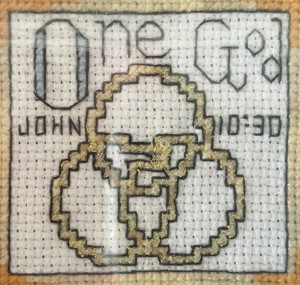 In John 10:30, Jesus says to the people listening: “The Father and I are one.”
In John 10:30, Jesus says to the people listening: “The Father and I are one.”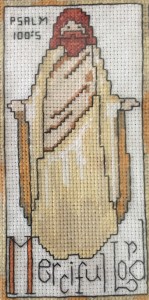 So I’ve been basing these #AtoZchallenge posts on a cross-stitch my Mum made for me a few years ago. Each letter depicts a title for God, with a picture and a Bible verse. Today’s letter, M, shows the phrase ‘Merciful Lord’ and the verse Psalm 100:5.
So I’ve been basing these #AtoZchallenge posts on a cross-stitch my Mum made for me a few years ago. Each letter depicts a title for God, with a picture and a Bible verse. Today’s letter, M, shows the phrase ‘Merciful Lord’ and the verse Psalm 100:5.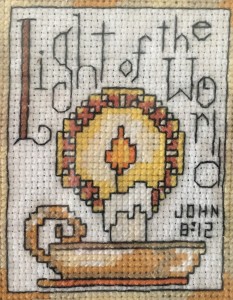 Contrast that to what the Bible says in John Chapter 8 verse 12. “When Jesus spoke again to the people, he said, “I am the light of the world. Whoever follows me will never walk in darkness, but will have the light of life.”
Contrast that to what the Bible says in John Chapter 8 verse 12. “When Jesus spoke again to the people, he said, “I am the light of the world. Whoever follows me will never walk in darkness, but will have the light of life.”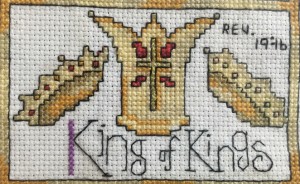 The book of Revelation, chapter 19 verse 6 calls Him “King of Kings and Lord of Lords”. As in, ‘so high above all over kings, and so far above all other lords’.
The book of Revelation, chapter 19 verse 6 calls Him “King of Kings and Lord of Lords”. As in, ‘so high above all over kings, and so far above all other lords’.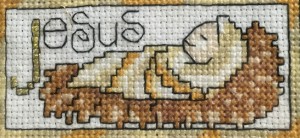 Nonetheless, it is a relatable illustration of God and His choice – to send His son to Earth, knowing He would be killed the most excruciating way possible. For us. Because it was the only way that He could save us from the consequences of our sin. And Jesus – who knew, and obeyed.
Nonetheless, it is a relatable illustration of God and His choice – to send His son to Earth, knowing He would be killed the most excruciating way possible. For us. Because it was the only way that He could save us from the consequences of our sin. And Jesus – who knew, and obeyed.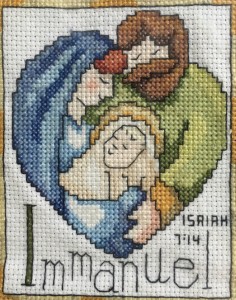 Today’s letter is “I” and one of the names given to Jesus in the book of Isaiah (chapter 7 verse 14) is “Immanuel”. This name means “God is with us”. Jesus, the Son of God, came down to Earth from heaven to be with us. The human race had sinned, and that sin had broken our relationship with God. And the consequences of that sin was death. But then Jesus came. He got in with us, in this situation that we’d managed to get ourselves into, and paid the price for us so that we could get out. He died, and took the consequences of sin onto Himself. And then when He rose again from the dead, conquering death, we now are able to as well. We can be saved. Which, like Norman is every episode, I am very grateful for!
Today’s letter is “I” and one of the names given to Jesus in the book of Isaiah (chapter 7 verse 14) is “Immanuel”. This name means “God is with us”. Jesus, the Son of God, came down to Earth from heaven to be with us. The human race had sinned, and that sin had broken our relationship with God. And the consequences of that sin was death. But then Jesus came. He got in with us, in this situation that we’d managed to get ourselves into, and paid the price for us so that we could get out. He died, and took the consequences of sin onto Himself. And then when He rose again from the dead, conquering death, we now are able to as well. We can be saved. Which, like Norman is every episode, I am very grateful for!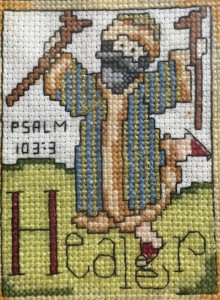 In the book of Psalms, Chapter 103 verse 3, the Bible says, “[the LORD] forgives all your sins and heals all your diseases…”
In the book of Psalms, Chapter 103 verse 3, the Bible says, “[the LORD] forgives all your sins and heals all your diseases…” I
I 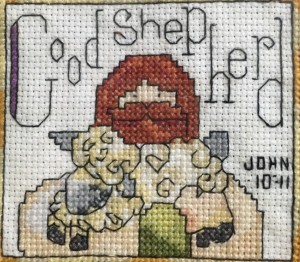 In the book of John, chapter 10, verses 11 to 14, Jesus says, “I am the good shepherd. The good shepherd lays down his life for the sheep. The hired hand is not the shepherd and does not own the sheep. So when he sees the wolf coming, he abandons the sheep and runs away. Then the wolf attacks the flock and scatters it. The man runs away because he is a hired hand and cares nothing for the sheep. I am the good shepherd; I know my sheep and my sheep know me.”
In the book of John, chapter 10, verses 11 to 14, Jesus says, “I am the good shepherd. The good shepherd lays down his life for the sheep. The hired hand is not the shepherd and does not own the sheep. So when he sees the wolf coming, he abandons the sheep and runs away. Then the wolf attacks the flock and scatters it. The man runs away because he is a hired hand and cares nothing for the sheep. I am the good shepherd; I know my sheep and my sheep know me.”